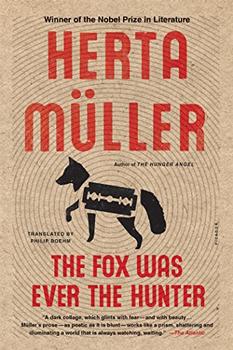Summary | Excerpt | Reviews | Beyond the book | Read-Alikes | Genres & Themes | Author Bio

A Novella and Stories
by Ismail KadareFrom the book jacket: Albania: the waning years of Communism. The
narrator, working for the state-controlled media agency, has taken as his lover
Suzana, the daughter of a high-ranking government official, rumored to be soon
appointed the dictator’s successor. Suzana’s father has forced her to end the
affair, which could damage, if not ruin, his career. Still, the young man has
received an invitation to attend the May First Parade on the Party platform: an
enviable privilege. While the usual ceremony of the regime’s self-glorification
unfolds, our narrator suddenly sees—between the flags, the propaganda streamers,
and portraits of the country’s leaders—the ghostly image of Agamemnon, the
terrifying general of the ancient Greeks. A hallucination or just his
imagination? Instinctively he senses that his "sin" of loving will result in his
own downfall, as Agamemnon’s was caused by sacrificing his daughter, Iphigenia.
In this spellbinding novel, written in Albania and smuggled into France a few
pages at a time in the 1980s, Kadare denounces with rare force the machinery of
the dictatorial regime, drawing us back to the ancient roots of Western
civilization and tyranny.
Also included are "The Blinding Order," a parable of the Ottoman Empire about
the uses of terrror in authoritarian regimes, and "The Great Wall," a chilling
duet between a Chinese official and a soldier in the invading army of the
horrifying Tamerlane.
Comment: A casual glance at the book jacket would lead most
prospective readers to assume that Agamemnon's Daughter was the latest
contribution to the genre of myth/history retold from the woman's point of view.
However, this is far from the case - the story of Iphigenia, Agamemnon's
daughter, is merely the powerful allusion through which Ismail Kadare examines
the regime of his home country of Albania in a story that he wrote in 1985 - a
time when Albania had been ruled by a chronically xenophobic, all dominating
dictatorship for 40 years, and there was no reason to believe that it would not
continue to be ruled in the same way for the foreseeable future.
There are a number of variations on the story of Iphigenia, but the general gist
is that Agamemnon, eager to set sail for Troy, finds his fleet stuck in harbor
due to unnaturally contrarian winds caused by an angry Artemis. Agamemnon is advised that the only way to appease the touchy
goddess is to sacrifice his daughter. Iphigenia is duly summoned and
Agamemnon gets ready to sacrifice her, at which point she is miraculously
transported away, and an animal deposited in her place.
There is no such happy ending for the protagonist of Agamemnon's Daughter,
in fact, there is no particular ending at all, except that we instinctively know
that eventually it will end badly. This is one of those stories in which
very little actually happens, but we come away weighed down with the weight of
oppression and deprivation all the more so because there is simply nothing that
our protagonist can "do", seeing as every aspect of his country's life is
controlled by a dictatorship that has long ago taken control of every physical
aspect of the country, and is now intent on wiping out the last elements of free
thought, the defining attribute of humanity, from among the people.
Agamemnon's Daughter was smuggled out of Albania by Kadare and his French
publisher in 1985, at a time when "exfiltration" of literary manuscripts was
strictly forbidden under Albanian law. It was eventually published in
2003. A companion novel,
The Successor, was written in Paris in 2002 and published around the
same time.
The second story is also a love story set in a malevolent world, and is in my
mind more powerful than the title story. The Blinding Order
(written in 1984), set in the Ottoman Empire, is a parable of an out of control
totalitarian regime ruling by fear and cruelty, in which the sultan degrees all
carriers of the "evil eye" be blinded - as neighbors turn on neighbors with
increasing degrees of paranoia the story goes full circle to reveal the
illogical brutality of such regimes.
The third story, which seems a little out of place, relates a conversation
between a Chinese official and a member of the 14th century Mongol conqueror
Tamurlane's invading army.
Most of us are used to reading books that combine the bitter with the sweet, but
there is little if anything sweet to grasp on to in these three stories - there
is no spoonful of honey to help the medicine go down but just like
The Swallows of Kabul, these stories are written with a humanity that will touch
your soul, if you give them a chance.
Albanian writer Ismail Kadare was born in Gjirokaster, Albania in 1936;
his father worked in the civil service. He studied at the Faculty of
History and Philology at the University of Tirana, graduating with a teaching
diploma in 1956, before moving to Moscow to study at the Maxim Gorky Literature
Institute, where he stayed until 1960 when relations between Albania and the
Soviet Union soured. More at
BookBrowse.
![]() This review
first ran in the January 4, 2007
issue of BookBrowse Recommends.
This review
first ran in the January 4, 2007
issue of BookBrowse Recommends.

If you liked Agamemnon's Daughter, try these:

by Herta Muller
Published 2017
An early masterpiece from the winner of the Nobel Prize hailed as the laureate of life under totalitarianism.

by Per Petterson
Published 2008
We were going out stealing horses. That was what he said, standing at the door to the cabin where I was spending the summer with my father. I was fifteen. It was 1948 and one of the first days of July.
Your guide toexceptional books
BookBrowse seeks out and recommends the best in contemporary fiction and nonfiction—books that not only engage and entertain but also deepen our understanding of ourselves and the world around us.